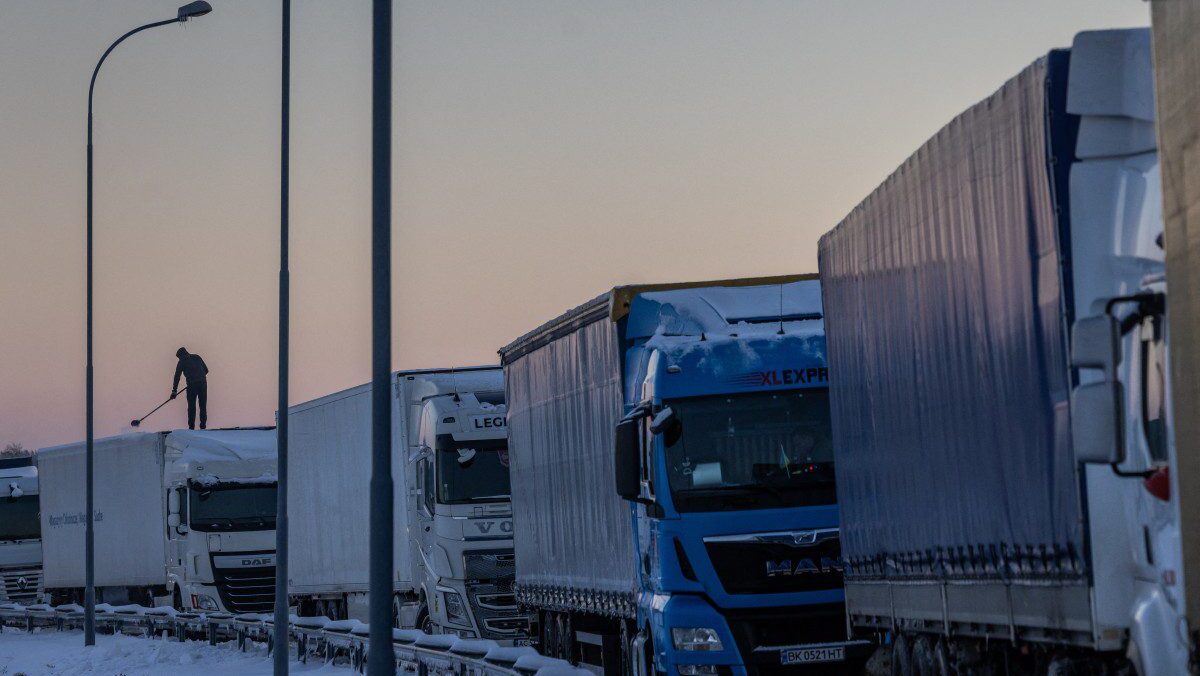
Trucks belonging to differents Polish transport company owners block the access to Polish-Ukraine border crossing in protest against unfair competition in Hrebenne, Poland, on December 4, 2023.
Photo: Wojtek Radwanski / AFP
The Polish government has struck a temporary deal with Polish farmers blocking a Ukrainian border crossing to protest cheap Ukrainian grain flooding their markets. The deal aims to alleviate the farmers’ tax burdens, but as Ukraine gets ready to start accession talks with the European Union, the farmers, fearing that their agriculture will be destroyed, will demand much tougher action from the new left-liberal government.
Polish truckers were the first group to start blocking three major border crossings with Ukraine at the beginning of November, protesting unfair advantages gained by Ukrainian truckers in Poland and the rest of the EU due to an EU-Ukraine agreement.
Polish farmers then launched a blockade at a fourth crossing, angered by Ukrainian grain imports into Poland that have undercut local prices and led the country’s former conservative government, alongside Slovakia and Hungary, to ban Ukrainian grain imports after EU restrictions ended last September.
The previous conservative government was committed to defending Polish farmers’ interests. Jarosław Kaczyński, leader of the former ruling party Law and Justice (PiS) said that agreements between Poland and Ukraine after Russia’s invasion “did not include a clause to abolish Polish agriculture.” Then-Agriculture Minister Robert Telus said that “in current conditions, Polish agriculture would never win against Ukrainian agriculture,” and that therefore, Poland will not allow Ukraine to join the EU unless measures are put in place to restrict the entry of its agricultural products.
However, for the new left-liberal government of Donald Tusk, the farmer protests could prove a challenge. Tusk has to balance the interests of Polish farmers and others with his desire to repair relations with Ukraine and his campaign promises to improve Poland’s relationship with the EU. One of his coalition partners, the Polish People’s Party, will be especially scrutinised about the issue, as it is traditionally supported by farmers, peasants, and rural voters.
Last week, the prime minister urged truckers “not to use the blockade as a method to defend their interests,” and said that his government would “do everything” to protect them.
For the time being, however, Polish truckers are still blocking traffic at the Ukraine-Poland border—creating queues of many kilometres—while the farmers have reached an agreement with the government, ending their protest on Saturday, January 6th. According to the deal, the government will launch corn subsidies worth one billion zloty (€230 million), increase liquidity loans, and maintain agricultural tax at the 2023 level. Roman Kondrów, a protest organiser, told AFP that they have only suspended their protest, but will continue to demonstrate if the government does not fulfil its promises.
Farmers have also previously asked to expand the import ban on Ukrainian agricultural products to items like sugar, eggs, and poultry, but this was not included in the deal.
As we reported, agricultural associations in all four Visegrad countries—the Czech Republic, Hungary, Poland, and Slovakia—recently called on the EU and their governments to find a joint solution to the problem of European markets being flooded with Ukrainian grain and other products. They emphasised that it is necessary to support the Ukrainian economy due to the Russian invasion but that such support cannot come at the cost of undermining farmers in Central Europe.
The new sovereigntist Slovakian government led by Robert Fico recently extended and expanded the ban on Ukrainian agricultural products to include honey, barley, wheat flour, soybeans, and cane or beet sugar. Agriculture Minister Richard Takáč complained that Ukrainian products had cost Slovakian farmers €110 million last year, while the European Commission only gave Slovakia €5 million in compensation.
In an interview in December, Hungarian Prime Minister Viktor Orbán said:
Ukraine is a large country, with an important agricultural sector. If you let this agriculture enter the European agricultural system, it will destroy it the very next day. We can’t let them in unless we transform our system of agricultural subsidies.
The EU agreed to start accession talks with Ukraine in December, but the road to membership will be long, and agriculture is just one of the thorny issues. As Robert Fico stated: accession “is a political decision that has nothing to do with reality. … Ukraine is absolutely unprepared to open the negotiations.”
